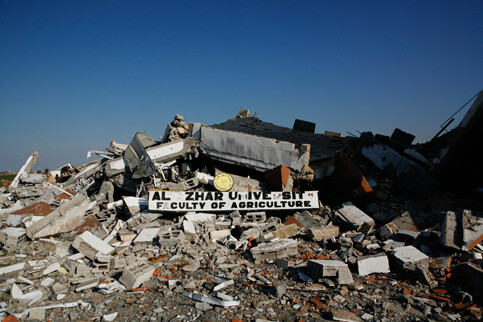The Electronic Intifada 27 March 2009

The Agricultural College of al-Azhar University in Beit Hanoun was destroyed by the Israeli attacks on Gaza. (Matthew Cassel)
GAZA CITY (IRIN) - Many university students who lost relatives or whose homes were destroyed during the recent 22-day Israeli offensive are finding it difficult to cope, according to university officials and students.
Some have been unable to register for the new semester due to lack of funds; others are still traumatized.
Al Mezan Center for Human Rights in Gaza said 14 of the 15 higher education institutions in the Strip (most are in and around Gaza City) were damaged by Israeli forces. Six came under direct attack.
Three colleges — al-Da’wa College for Humanities in Rafah, Gaza College for Security Sciences in Gaza City, and the Agricultural College in Beit Hanoun (part of al-Azhar University) — were destroyed, according to Al Mezan communications officer Mahmoud AbuRahma.
Six university buildings in Gaza were razed to the ground and 16 damaged. The total damage is estimated at $21.1 million, according to the Palestinian National Early Recovery and Reconstruction Plan for Gaza.
The Israeli offensive — in retaliation for continued Hamas rocket-fire from Gaza into Israel — began on 27 December 2008 and ended on 18 January 2009.
Islamic University
Just after midnight on 28 December the Islamic University was targeted in six separate air strikes, according to eyewitnesses.
The two main buildings on campus were completely destroyed, while nine others were damaged; water, electrical and internet systems were affected, according to the university’s president, Kamalain Shaath.
“The two [main] buildings contained 74 science and engineering laboratories equipped with thousands of pieces of apparatus,” said Islamic University public relations officer Hussam Ayesh.
The university, which has 22,000 students enrolled, wants to rebuild and renovate but lacks building materials due to the Israeli blockade; Israel is very unlikely to allow in replacement laboratory equipment, without which it will be difficult for classes to resume.
“Only basic food commodities and essential humanitarian items are permitted to enter Gaza,” said spokesperson for the Israeli Civil Liaison Administration Maj Peter Lerner.
The Israeli military said the Islamic University was being used by Hamas to develop and store weapons, including Qassam rockets used to target Israeli civilians. The university and Hamas deny the allegations.
The Islamic University has estimated the damage at $15 million. By contrast, tuition fees for the 2009 semester only amount to $10 million. The university has appealed for help and halved the minimum initial payment required by students.
“Tuition fees are now a problem for more than 70 percent of the students and many have missed the semester,” said Abdel Rahman Migdad, 20, a third year business studies student. “Books are unavailable due to the siege and most students can’t even afford photocopies — and now we even lack ink for the photocopiers.”
Al-Azhar University
Al-Azhar, Gaza’s second largest university, generally seen as pro-Fatah (the political faction associated with Mahmoud Abbas in the West Bank) was hit on the same day.
“Three thousand of the 20,000 registered students could not return this semester due to issues related to the war,” said public relations officer at al-Azhar University Sameh Hassanin, who also said there had been a 20 percent increase in the number of students unable to afford fees since the offensive ended.
“Students lack funds for transport and books, and are struggling,” said Hassanin. The university also lacks paper, spare parts and ink for copiers.
The Agricultural College in Beit Hanoun was completely destroyed, with the damage estimated at $4.3 million, according to university officials.
This item comes to you via IRIN, a UN humanitarian news and information service, but may not necessarily reflect the views of the United Nations or its agencies. All IRIN material may be reposted or reprinted free-of-charge; refer to the copyright page for conditions of use. IRIN is a project of the UN Office for the Coordination of Humanitarian Affairs.


